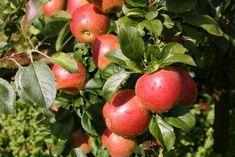
The Organic apple industry is set to undergo a taste and quality revolution, thanks mainly to four little-known varieties from the Czech Republic and Germany.
Research carried out over five years by a consortium co-financed by Defra’s Horticulture Link fund, the Horticultural Development Council and East Malling Research (EMR) has identified five varieties in all as having the potential to offer a full season of English organic apples. They are likely to be renamed in the UK, if further trials are successful.
The cross-industry consortium was composed of Waitrose, Sainsbury’s, the HDRA, EMR, Worldwide Fruit, OrchardWorld, Fourayes, organic grower Matthew Wilson, and conventional grower Robert Balicki. The project was managed by Adrian Barlow and scored 8/10 when its results were presented to the Link committee.
It aimed to find out if specific pest and disease problems could be overcome, in order that organic apples could be grown successfully in the UK. The five varieties identified are:
• Resi, from Germany, which picks at the end of September until late January or early February. It is resistant to scab, tolerant of mildew, and sweet, crisp and juicy.
• Rubinola, which is Czech and picks in mid-September with a season running until December. It is resistant to scab and has high powdery mildew tolerance.
• Rubinstep, also Czech, which picks in mid-late September. It has high sugar levels and firm flesh.
• UK-bred Red Windsor, a second-early dessert variety with a short season with possible resistance to scab and mildew. It has Cox attributes and is rich, aromatic, crisp and juicy with a honeyed flavour.
• A third Czech strain, Rajka, that stores very well. It is a large-medium size, has yellowish flesh and a hint of strawberry flavour.
All five are bi-coloured and were first introduced in the 1980s. “This is a major step forward,” said Barlow. “The research results have exceeded Defra’s expectations.”
The collaboration of different links in the supply chain, and particularly the active involvement of the retailers, on this project adds significance to its results, said Barlow.
Sainsbury’s sensory panel played a key role in whittling the number of varieties down from 167 to just five and EMR is planting 3 hectares of each for trial purposes. Both Waitrose and Sainsbury’s are already understood by Barlow to be recommending the varieties to organic growers. He anticipates that grafting will begin next autumn.
The Soil Association said it is extremely excited about the results.
“It sounds really good and it is great that the supermarkets are being so forward,” said Rob George, senior technical officer at the Soil Association. “The disease resistance looks brilliant and certainly if some of the varieties can be stored in air then that is very impressive."



